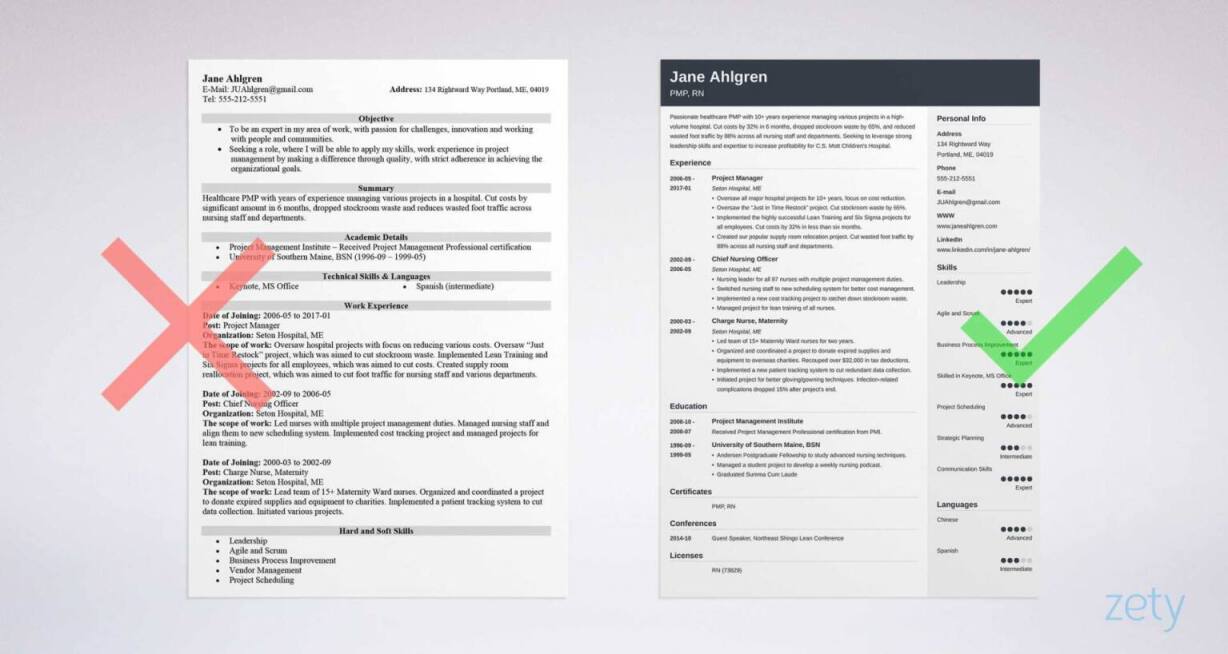How Long Should a CV Be? The Best Page Length for Your CV
Create your CV nowIf you’re just looking for the bottom line, here it is:
A CV for a job should be between one and four pages long, depending on your relevant professional experience, career level and skills. Two-page-long CVs are most common in the UK.
But—
There’s an art and science to the perfect CV length.
Picture this scenario.
You send out your 1-page CV, the hiring manager takes one look, “hmm, too short, probably lacks experience.” Your CV lands in the bin.
You send out your 2-page CV, the hiring manager takes one look, “hmm, too long, I can’t be bothered.” Your CV lands in the bin.
So how long should your CV be to have the hiring manager say “yes, this is what I was looking for!”
This guide will show you:
- How long your CV should be not to get passed up by hiring managers.
- How to make your CV the ideal length by adding exactly the right things to catch the recruiter’s attention.
- How to shorten your overly long CV without losing your key skills and accomplishments.
Want to save time and have your CV ready in 5 minutes? Try our CV builder. It’s fast and easy to use. Plus, you’ll get ready-made content to add with one click. See 20+ CV templates and create your CV here.
Sample CV made with our builder—See more CV examples here.
1. How Many Pages Should a CV Be?
Some sources say your CV length should only be one or two pages. But that’s not strictly true. As a rule of thumb, a one page CV is enough for graduates or entry-level roles. But if you’re more experienced you can write a two page CV or even a three page CV for senior and specialist jobs.
The length of a CV conveys the level of your career experience and skills, but also how tailored it is to the given job opening. 3-page-long CVs for entry-level positions are probably going to be waffly while a 1-page CV for a senior management position gives the feeling that something is missing.
So what is the ideal CV length?
Let’s take a closer look at the most common options and go through how they may make or break your career prospects and in which situations they’re ideal for you.
1-page CV
This is acceptable for positions that are entry level or for candidates with little or no professional experience. It can also work for candidates who have less than a couple of years’ career experience.
For the most part, a one-page CV is enough for job seekers just starting out to include the necessary information for a given position (CV personal statement, experience, education, skills, and additional relevant information). That said, there is no need to get your knickers in a knot trying squeeze everything onto one page. More on that below.
2- or 3-page CV
Can a CV be 2 pages? Yes. 3 pages? Also.
In the UK, two to three pages is viewed as the norm for a wide variety of job seekers, starting off from graduates. At the same time bear in mind that the number of pages should be tailored to your experience and the requirements of the offered position.
Three pages is a better option for candidates with more work experience and/or applying for senior or specialist roles where the requirements are more numerous and demanding (especially in sectors such as medicine, law, or civil service).
4-or-more-page CV
Simply put, you don’t need your CV to be this long and you stand the risk of having your CV ignored. That said, however, there are some specific cases in which this CV length would work.
If you have multiple, relevant skills or 15 years of career experience you need to prove (because that’s what the recruiter is looking for), then it might turn out that you’ll need more than two to three pages. In these situations, it’s acceptable to extend your CV to four pages.
CVs that are longer than 4 pages are generally considered too long.
Keep in mind that recruiters aren’t sitting down with a pint to have a comfortable read of your CV; they’re in fact using about 8 seconds to determine whether you’re worth a call. Overly long CVs are simply naturally discouraging.
So that's length dealt with. How about format? Would a skills-based CV work for you? Read more here: Skills Based CV Format [Complete Guide]
2. How Far Back Should Your CV Go?
One of the most common questions job seekers ask is how much employment history should be on their CV.
That’s not entirely the right question to ask. It’s not about quantity, but quality when it comes to anything included in your CV. A better question would be—does this employment history bring value to my CV?
Let’s take this example—you’re applying for an SEO specialist position that requires at least 2 years of experience in copywriting and content optimization. The hiring manager is going to be very interested in the 3 years you spent working at Booking.com optimizing their travel content, but probably not so much in the 10 months you worked the till at Sainsbury’s half a decade ago.
Generally speaking, you shouldn’t need to go back further than 15 years in your professional experience on your CV.
However, like with most things, there are exceptions. This is especially true for those who are changing careers or returning to a previous career path after a long absence.
Let’s say, for example, that you worked as a personal assistant for a couple of years before switching to a career in sales. After several years of different sales jobs, you’ve decided to go back to being a personal assistant. It would be beneficial for you to cover that experience on your CV even though it might go back rather far in your career history.
One page or two, see how it'll look when complete, check out these templates: 20+ Free CV Templates to Download Now
3. How Many Bullets Should You Add Per Position?
It’s only natural to want to include every responsibility you had under the sun in order to prove how much you can do and were responsible for. But in this case, less is definitely more.
List up to 6 bullet points on your CV for your most recent job. Shave down the number of bullets the further you go back in time.
Your oldest positions shouldn’t have more than a maximum of 3 bullet points (honestly, not many people are going to be interested in what you were doing back when computers were the size of barns and you were sporting a mullet.)
This way your current responsibilities, which usually interest the hiring manager most, will stand out more.
Making a CV with our builder is incredibly simple. Follow our step-by-step guide, use ready-made content tailored to your job and have a CV ready in minutes.
When you’re done, Zety’s CV builder will score your CV and tell you exactly how to make it better.
4. Tips on How to Shorten Your CV
Have you followed all of the above advice, but find your CV is still too long? Here are some common mistakes that increase the amount of pages in your CV and some tips on how to fix them:
Resize Your Font
Check the size of your font. The best size font is 10 or 12 for the majority of your text. It’s fine for your headers to be bold and a little larger (14–16 font).
Also note that decreasing the font size to make all your text fit onto one or two pages isn’t a great idea. Hiring managers will simply bin a CV they need a magnifying glass to read.
Furthermore, use simple, sleek fonts (e.g. Calibri, Helvetica). Some fonts can unnecessarily take up a lot of space.
Measure Your Margins
Check to see the size of your margins. If they meet halfway on the page or you can’t find them at all, you’ve done made a right mess of things.
One inch margins all around should do the trick.
Dial Down the Design of Your CV
If your CV template looks like a pinata exploded on the screen, you’ve gone a little too far.
Unless you’re applying for a creative position, consider changing your CV template to something simpler to clear up some space on the page.
Clear Away All the Fluff
Your CV is a marketing tool designed to sell your candidacy to the hiring manager, not be your autobiographical chance at winning the Booker Prize.
As William Faulkner famously said about writing, “kill your darlings.” Take a hard look at all the sections in your CV. Do you need all of them? Do they all bring equal value?
Turn long, run on sentences into bullet points so you stick to the important information. An added benefit is that it makes the CV much easier to read.
Job seekers often have a tendency to particularly overinflate their CV personal statement. It might be the first thing the recruiter sees, but if it’s a half a page long, no one is ever going to move on to the experience and skills sections before marking it as utter rubbish.
Keep your CV personal statement brief and snappy, enticing the recruiter to read on.
If you still feel an itch to elaborate on key points in your job experience, do that in your cover letter. That’s exactly what it’s for!
Reduce Repetition
Make sure that the points mentioned in your CV are all individual points that attribute to your value to the employer. Rehashing the same information or skills over and over will get your CV tossed out faster than cold fish and chips.
Get even more CV writing tips here: 20+ Job Winning CV Tips and Advice
Make sure you've chosen the right format too: Best CV Format for Job Application Success
Plus, a great cover letter that matches your CV will give you an advantage over other candidates. You can write it in our cover letter builder here. Here's what it may look like:
See more cover letter templates and start writing.
Key Takeaway
By now, you’ve probably noticed that one thing is clear—there are no absolute rules that govern how long a CV should be. However, we’ve given you the necessary tips and advice to help you determine how long your CV should be for the job you are applying for.
When looking at your CV again, remember these key points:
- Tailor how long your CV is to the amount of experience the job requires (i.e. no four-page CVs for an entry-level job).
- Generally don’t go back farther than 15 years’ work experience.
- More recent positions in your career history should have more bullet points (around six), later ones fewer (around two to three).
- Keep your CV relevant, legible, and clear.
About Zety’s Editorial Process
Our editorial team has thoroughly reviewed this article to ensure it follows Zety’s editorial guidelines. Our dedication lies in sharing our expertise and providing you with actionable career advice that offers you real value. Every year, the quality of our content attracts 40 million readers to our site. But that’s not all – we conduct original research to gain a detailed understanding of the labour market. We take pride in being cited by top universities and leading media outlets in the UK and worldwide.






